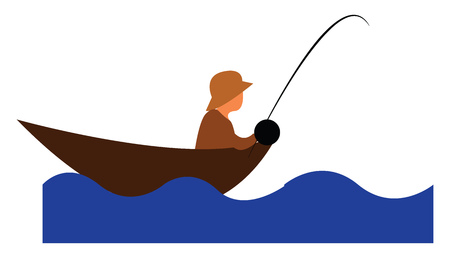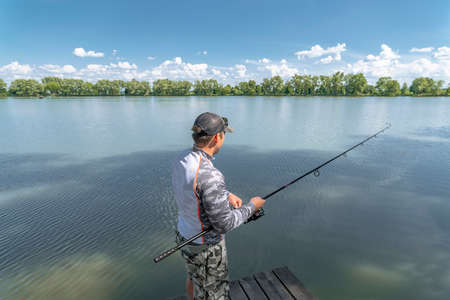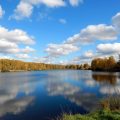Introduction to Carp Fishing in England
Carp fishing holds a special place in the heart of English angling culture, with roots stretching back centuries. Unlike many other countries where fishing is often seen as a means to gather food or simply a competitive sport, carp fishing in England has evolved into a deeply cherished pastime, marked by tradition, patience, and camaraderie. The country’s tranquil lakes and well-managed fisheries offer an idyllic setting, attracting anglers from all walks of life—young and old, novice and expert alike. This enduring appeal lies not just in the thrill of landing a prized specimen but also in the unique rituals and etiquette that define the English carp scene. From dawn-lit bivvies on misty banks to the respectful catch-and-release philosophy, English carp fishing is an experience steeped in respect for both nature and heritage.
Historically, carp were introduced to England by monks in the Middle Ages, primarily for food. Over generations, however, they became the quarry of choice for those seeking a true test of skill and patience. Today, English anglers prize not only the size and beauty of their catches but also the peaceful escape and sense of community found at local fisheries. In contrast to regions where competitive tournaments or high-intensity tactics dominate, the English approach is more about enjoying the journey than merely tallying results.
| Aspect | England | Other Countries |
|---|---|---|
| Main Focus | Tradition & Relaxation | Competition/Sport or Food Gathering |
| Fishing Style | Catch & Release, Long Sessions | Often Shorter Sessions or Keeping Fish |
| Cultural Importance | Deeply Rooted Heritage | Varied (less emphasis on history) |
| Common Settings | Lakes & Managed Fisheries | Rivers, Reservoirs, Wild Waters |
This rich blend of history, technique, and local flavour makes carp fishing in England a singular adventure—one that continues to inspire generations while adapting new methods and respecting time-honoured traditions.
Top Carp Fishing Lakes Across England
England boasts a wealth of premier carp fishing lakes, each offering a unique angling experience shaped by local character and tradition. Whether you’re seeking the challenge of elusive specimens or the charm of tranquil waters, there’s something for every carp enthusiast. Let’s explore some of the most celebrated venues across the North, Midlands, South, and East, each reflecting the rich diversity of English carp fishing culture.
The North: Rugged Beauty & Community Spirit
The North is renowned for its picturesque landscapes and friendly atmosphere. Venues here often blend impressive stock with a warm local welcome.
| Lakes | Location | Key Features |
|---|---|---|
| Linear Fisheries | North Yorkshire | Well-stocked, scenic, popular among specimen hunters |
| Birkwood Farm Fisheries | Wakefield, West Yorkshire | Mixed waters, family-run, strong angling community |
The Midlands: Accessible Hotspots & Historic Waters
Centrally located, the Midlands offers easy access from all directions and is home to several iconic carp venues.
| Lakes | Location | Key Features |
|---|---|---|
| Bluebell Lakes | Northamptonshire | Big fish potential, top facilities, famous on the circuit |
| Cotswold Water Park | Gloucestershire/Wiltshire border | Over 150 lakes, historic gravel pits, specimen carp galore |
The South: Legendary Names & Big Carp Heritage
The South is synonymous with legendary carp waters and some of the largest fish in the country—steeped in angling folklore.
| Lakes | Location | Key Features |
|---|---|---|
| Wraysbury 1 & 2 | Berkshire | Historic venue, record-breaking carp, exclusive feel |
| Nash Lakes (Church Lake) | Essex | Trophy fishery, modern amenities, respected management |
The East: Tranquil Escapes & Traditional Settings
If you’re after peace and classic countryside charm, the East offers a slower pace and plenty of hidden gems.
| Lakes | Location | Key Features |
|---|---|---|
| Suffolk Water Park | Suffolk | Diverse waters, relaxed vibe, good for all levels of experience |
| Alderson Lake (Fenland Fisheries) | Cambridgeshire/Norfolk border | Lush surroundings, well-maintained swims, friendly locals |
A True Local Experience: What Sets Each Region Apart?
The North stands out for its community-led waters and rugged scenery; the Midlands’ accessibility makes it a favourite for social sessions; the South combines history with monster carp; while the East delivers tranquillity and understated quality. No matter where you cast your line, expect warm banter on the bank—and perhaps a tip or two from local anglers over a cuppa. England’s regional variety ensures that every trip feels like a new adventure.

3. Essential Gear and Local Tackle Recommendations
Having the right gear is crucial for a successful carp fishing session on England’s renowned lakes. Over the years, local anglers have refined their kit to suit the unique demands of British waters, blending practicality with tradition. Here’s a breakdown of must-have equipment and some trusted local sources to get you started.
Must-Have Carp Fishing Kit
| Item | Description | Top UK Brand |
|---|---|---|
| Rods & Reels | 12-13ft carp rods paired with robust baitrunner reels are standard among English anglers, ideal for handling powerful runs. | Daiwa, Nash, Fox |
| Bite Alarms | Essential for detecting subtle takes, especially during overnight sessions on busy waters. | Delkim, Gardner |
| Bivvy/Tent | A sturdy bivvy will keep you dry through unpredictable British weather; look for quick-setup designs. | Trakker, JRC |
| Nets & Mats | Large landing nets and unhooking mats are vital for safe fish handling and conservation—an expectation at all top venues. | Korda, Avid Carp |
| Tackle Box Essentials | Include rigs, hooks (size 4–8), leads (2–4oz), PVA bags, and boilies tailored to local carp preferences. | Korda, ESP, Mainline Baits |
Local Tackle Shops: Where to Stock Up
If you want authentic advice or need last-minute supplies, England’s tackle shops are goldmines. Pop into independent stores near major lakes for up-to-date catch reports and regional bait tips—the staff are often seasoned anglers themselves. Here are a few recommended stops:
- The Tackle Box (Kent): Known for expert service and a huge range of specialist carp gear.
- Total Fishing Tackle (Essex): Popular with locals fishing Essex’s prolific waters; offers next-day delivery if you’re in a pinch.
- Aquatic Bait & Tackle (Lancashire): Friendly northern advice and plenty of locally sourced baits that can make all the difference.
Why Choose British Brands?
British brands have earned their reputation by designing tackle specifically for the country’s varied waters and temperamental climate. Their products reflect decades of innovation informed by real-world angling experiences—so you know your kit will hold up when that big common finally takes your bait.
Pro Tip from the Bank:
If you’re heading out for an extended session, always double-check your bivvy pegs and waterproofs before leaving home. There’s nothing more British than four seasons in one day—and nothing worse than being caught unprepared beside the lake!
4. Understanding Local Etiquette and Fishing Regulations
If you’re planning to experience carp fishing in England’s premier lakes, understanding both the written rules and the unspoken etiquette is just as important as perfecting your cast. Adhering to regulations not only keeps you on the right side of the law but also helps preserve these beautiful fisheries for generations to come.
Key Rules Every Angler Should Know
The Environment Agency (EA) oversees freshwater fishing across England. Before you even set up your bivvy, make sure you’ve secured a valid rod licence, which is mandatory for anyone aged 13 or over. The table below summarises some essential requirements:
| Requirement | Details |
|---|---|
| Rod Licence | Mandatory for all anglers aged 13+; available online or at post offices |
| Number of Rods | Standard licence covers up to 2 rods; additional licence needed for 3-4 rods |
| Close Seasons | Some rivers have closed seasons (15 March–15 June); most stillwaters open year-round |
| Bait Restrictions | Certain venues limit types/amounts of bait (e.g., boilies, particles) |
Unspoken Etiquette: The Social Side of Carp Fishing
Beyond official rules, English anglers cherish a code of conduct that keeps the banks friendly and respectful. Key points include:
- Swim Respect: Never cast into another angler’s swim without permission.
- No Littering: Always leave your peg tidier than you found it – “Take only memories, leave only footprints.”
- Noise Levels: Keep voices low and avoid blaring music; tranquillity is part of the charm.
- Nod and Greet: A polite nod or “alright mate?” goes a long way with locals.
Practical Tips for Staying on the Right Side of Local Customs
If you’re new to UK carp waters, consider these seasoned tips:
- Always check site-specific rules at each lake; some require pre-booking or ban certain rigs.
- Use unhooking mats and barbless hooks where required – fish care is paramount.
- If in doubt, ask! Most local anglers are happy to share advice if approached respectfully.
The Role of Bailiffs and Club Officials
Bailiffs regularly patrol popular venues, checking licences and offering guidance. Treat them with respect—they’re there to help everyone enjoy their session safely and legally.
Summary Table: Essential Checks Before You Fish
| Task | Why It Matters |
|---|---|
| Purchase EA Rod Licence | Avoid fines; supports conservation efforts |
| Read Venue Rules Board | Keeps you compliant with specific lake policies |
| Packing Tidy Up Kit | Makes clean-up quick and easy; shows respect for nature and fellow anglers |
Navigating England’s carp fishing scene is about more than just landing a big mirror or common. By respecting both written regulations and unwritten etiquette, you’ll find yourself welcomed into one of Britain’s most passionate angling communities—and ensure these lakes remain world-class destinations for years to come.
5. Effective Carp Fishing Techniques for English Waters
When it comes to carp fishing in England, local anglers rely on a blend of tried-and-tested techniques and modern approaches. Understanding what works best on British lakes can dramatically improve your catch rate and experience. Below, we break down the most effective methods, bait choices, and insider strategies that seasoned UK carp fishers swear by.
Time-Tested Methods
English waters often require subtlety and patience. Some of the most dependable tactics include:
- Ledgering: This involves using a weight to anchor your bait to the lakebed—a staple technique for targeting wary carp in stillwaters.
- Float Fishing: Particularly useful in shallower margins or when stalking carp near reeds and lilies.
- Surface Fishing: On warmer days, floating baits such as bread or dog biscuits can tempt cruising carp to strike at the top.
Bait Choices Preferred by UK Anglers
The right bait is essential, and preferences often reflect the specific conditions of English lakes. Here’s a handy table outlining popular choices and their ideal use cases:
| Bait Type | Best Season | Recommended Usage |
|---|---|---|
| Boilies | All year (flavours vary by season) | Mainline baits, pop-ups for rigs |
| Sweetcorn | Spring/Summer | Margin fishing, especially in coloured water |
| Pellets | Late spring to early autumn | Spodding or method feeder mixes |
| Bread/Surface Baits | Summer | Floating for surface-feeding carp |
Insider Strategies from Veteran Carp Fishers
- Location is Everything: Spend time observing water features—carp love gravel bars, overhanging trees, and reed beds.
- Pre-baiting: Regularly introducing small amounts of bait to your chosen swim before fishing can build carp confidence and boost your results.
- Tackle Finesse: Use lighter lines and smaller hooks when waters are pressured or clear; heavier gear may be necessary for snaggy venues like those found in some historic estate lakes.
Tactics for Changing Conditions
If weather changes suddenly—a frequent occurrence in the UK—don’t hesitate to adapt. For instance, after heavy rainfall, fish may move into newly flooded margins. In colder months, scale back bait quantities and opt for high-attract single hookbaits such as bright pop-ups.
A Final Word from the Bank
No matter how seasoned you are, there’s always something new to learn on England’s premier lakes. Chat with locals, keep an open mind, and remember: consistent success comes from a combination of patience, observation, and a willingness to adapt your approach to each unique water.
6. Seasonal Tips and Weather Considerations
When it comes to carp fishing in England, the ever-changing British weather and distinct seasons play a pivotal role in both carp behaviour and your chances of landing that prized catch. As any seasoned angler will tell you, understanding how carp respond to seasonal changes is just as important as knowing the right rig or bait. Below, I’ve shared some hard-earned insights for making the most of each season, so you can adapt your tactics and maximise your time on the bank—rain or shine.
How Seasons Shape Carp Fishing Success
| Season | Typical Carp Behaviour | Angling Tips |
|---|---|---|
| Spring | Carp wake up from winter sluggishness, move into shallower waters as temperatures rise, and begin feeding more actively. | Focus on south-facing banks warmed by the sun, use lighter baits like sweetcorn or maggots, and keep mobile until you find active fish. |
| Summer | Carp are at their most active; spawning may occur early summer. They patrol margins and open water, often basking near the surface on hot days. | Surface fishing with dog biscuits or bread can be highly effective. Early mornings and evenings usually yield best results due to lower light and cooler temps. |
| Autumn | Carp feed heavily to build reserves for winter; they become more catchable as water cools but remain relatively active. | Switch to high-protein boilies or pellets, target deeper areas as nights lengthen, and stay vigilant for sudden weather changes which spur feeding frenzies. |
| Winter | Carp become lethargic, feeding windows are short and dictated by mild spells. Fish tend to shoal up in deeper, sheltered spots. | Use small baits and scale down tackle. Focus on midday when water is warmest, and don’t be afraid to move if you’re not getting bites. |
Dealing with Britain’s Notorious Weather Swings
The phrase “four seasons in one day” isn’t just idle banter here—it’s a lived reality for UK anglers. Sudden rain showers, gusty winds, or unexpected frosts can all impact carp activity. Always check the local forecast before heading out, but also pack flexibly: waterproofs are essential even in July! Winds blowing into a bank can push natural food sources and attract carp—so fish with the breeze at your back when possible.
If you’re new to English carp fishing, remember that local knowledge goes a long way. Chatting with regulars about recent catches or microclimates around specific lakes can save you hours of guesswork.
Ultimately, adapting your tactics to both the season and day-to-day weather swings is what separates those who simply fish from those who consistently catch. With patience—and a good flask of tea—you’ll soon learn to see each shift in weather not as a setback but as an opportunity.
7. Local Insights: Community, Events, and Hidden Gems
If you’re serious about immersing yourself in the English carp fishing scene, becoming part of the local community is essential. Joining an angling club not only opens doors to exclusive waters but also provides an opportunity to learn from seasoned anglers who know these lakes inside out. Many clubs welcome newcomers and offer mentorship schemes for those keen to hone their craft. Engaging with these communities—whether online or at the bankside—is your ticket to discovering insider tips, new friendships, and even a few jealously guarded secrets.
Annual Events and Competitions
England’s carp fishing calendar is packed with events, ranging from friendly socials to fiercely contested competitions. Participating in these occasions is an excellent way to test your skills, share a brew with fellow anglers, and experience the camaraderie that defines British fishing culture. Below is a summary of key annual events:
| Event Name | Location | Time of Year | Description |
|---|---|---|---|
| The British Carp Angling Championships (BCAC) | Various venues nationwide | Spring – Autumn | Prestigious pairs competition attracting top UK talent. |
| The Big One Show | Farnborough & Stoneleigh | March & November | Exhibition featuring tackle demos, celebrity anglers, and seminars. |
| Carp Society Winter Socials | Horseshoe Lake, Gloucestershire | Winter months | Relaxed gatherings with food, talks, and plenty of banter. |
| Local Club Matches | Lakes across England | Year-round | Smaller-scale contests perfect for meeting local enthusiasts. |
Hidden Gems: Off-the-Beaten-Track Venues
While iconic lakes often grab the headlines, many locals cherish less-publicised venues where the atmosphere is tranquil and the fishing can be sublime. These hidden gems may not feature in glossy magazines but are prized for their character and sometimes surprisingly large resident carp. Here are a few beloved by local anglers:
- Brampton Lake (Cambridgeshire): A quiet syndicate water known for its pristine commons and low angling pressure.
- Swan Valley Lakes (Essex): A collection of smaller pits offering great sport away from the crowds.
- Knotford Lagoon (Yorkshire): Loved by northern anglers for its wild feel and specimen fish.
- The Old Mill Pond (Cornwall): A picturesque setting where time seems to stand still.
Advice for Newcomers: Getting Involved Locally
- Attend Open Days: Many clubs host open days or ‘have-a-go’ sessions—ideal for networking and picking up advice.
- Join Forums & Social Groups: Online platforms such as The Carp Forum or Facebook groups are brimming with local knowledge.
- Visit Tackle Shops: Independent tackle shops are often at the heart of the community; staff can point you towards friendly venues and upcoming events.
- Volunteer: Helping out at work parties or lake maintenance days is a brilliant way to meet regulars and get involved behind the scenes.
Final Thought
Diving into England’s carp fishing scene is more than just catching fish—it’s about embracing tradition, sharing stories over a cuppa, and uncovering waters that only locals truly appreciate. Engage with the community, attend events, explore hidden gems, and you’ll soon find yourself welcomed as part of this uniquely British pastime.


